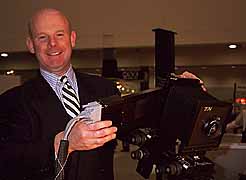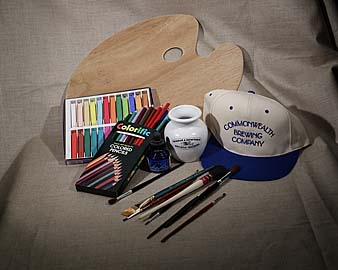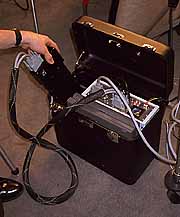Dicomed's digital replacement for 5 x 4 darkslides
by John Henshall

Dicomed's Trevor Haworth demonstrates the Dicomed Digital Camera Back

The camera inserts into any 4 x 5 camera, just like
a film holder. At 72 by 90mm (2.8 by 3.5 inches) the scanned area is somewhat
smaller than 4 x 5 inches but no camera modification is required: you focus
and compose normally on the ground glass. This also makes it easy to interchange
between film and digital - even for the same subject. Maximum scan resolution
is 6000 by 7520 pixels using an expensive - and good quality - Kodak trilinear
CCD. Maximum file size is 129mb, scanned in about four minutes.

I scanned the accompanying picture of the set-up on the Dicomed booth
as a 18mb file in 2 minutes 21 seconds, then compressed it heavily, using
Adobe Photoshop 2.5.1, down to a 858 kilobyte file for transmission across
the Atlantic to the editor - one twentieth of its original file size. The
subject was lit using tungsten light - somewhat less expensive than HMI,
though producing much more heat. The original file is very pure and free
from noise or other artifacts. Whilst the accompanying image may not quite
be representative of Dicomed's full quality potential, it is a real-life
example of what you can get down the line. Sending big files around the
world is prohibitively expensive and compression brings digital imaging
into the real world. In operation, my only criticism of the Dicomed is the
very low resolution of the preview image. It would be nice if this could
be improved.

A very important feature of the $20,000 Dicomed digital camera is that
it is portable. The whole kit - 1gb hard drive, Macintosh PowerBook 180c
to drive the camera, the digital back, batteries and mains adaptor - fits
into a transportable case. The user interface is very easy to operate and
the only connection between PowerBook and camera is by a serial cable.